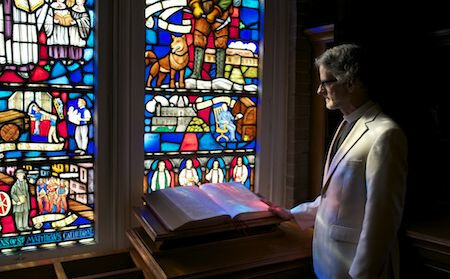Cicero on Friendship

Here I was, sixty years old, and I had never read Cicero’s “On Friendship.” I mentioned this lack to my children and they expressed surprise; it was a text they had each read in college. So, rather than just reading the thing alone, I got some of my friends to agree to read this text and then we would all meet for dinner to discuss it. Which we did.
We had found it beautiful. Cicero describes friendship as the one good thing in life that no one would willingly do without. “Many disdain riches, because they are content with little and take delight in meagre fare and plain dress; political honours, too, for which some have a burning desire. . . . Likewise other things, which seem to some to be worthy of admiration, are by many thought to be of no value at all. But concerning friendship, all, to a man, think the same thing: those who have devoted themselves to public life; those who find their joy in science and philosophy; those who manage their own business free from public cares; and, finally, those who are wholly given up to sensual pleasures—all believe that without friendship life is no life at all.”
Cicero says that even a vicious, angry person wants someone else to tell about those things that stir up those passions in him. And even if someone were to “ascend alone into heaven and behold clearly the structure of the universe and the beauty of the stars, there would be no pleasure for him in the awe-inspiring sight.” There would be pleasure, indeed he would be filled with delight at what he saw, if and only if he had a friend, “someone to whom he could describe what he had seen.”
“Without friendship life is no life at all.” But what is friendship? Here our conversation lifted itself up from Cicero and started being about ourselves. We talked about different experiences with friends, about friendships that had broken off, about the difficulties of having friends and being married (or having friends and not being married). There were copies of Cicero’s little dialogue all around the table, a discussion of friendship from the time of ancient Rome; and there were friends all around the table, themselves discussing friendship in our world today.
I have no neat conclusions. But I have one certainty. And it is that there is nothing more important to human life than friendship. And I have one clue to that friendship. On the night before he died, Jesus told his disciples that they were no longer his servants or students or followers. They were, instead, his friends.
---
Out & about. This week my Sunday class, “Strange but True Things about God,” will be on evil. If God is the creative source of everything that is, and if indeed God is the cause of my free actions, it would seem we must say that God is the cause and source of evil in the world. I will argue against that conclusion and try to show how evil, although a mystery, is not something that God could be the cause of. You’re welcome to join me at 10:20 a.m. in Room 119 of the education building at Incarnation, 3966 McKinney, Dallas.
My talk from last week, on freedom and grace, is here:https://www.amazon.com/clouddrive/share/GOZs8sjp9n4hXrKjVkj9cXh6NqIDJD9K2QSEqDXhool?_encoding=UTF8&mgh=1&ref_=cd_ph_share_link_copy

